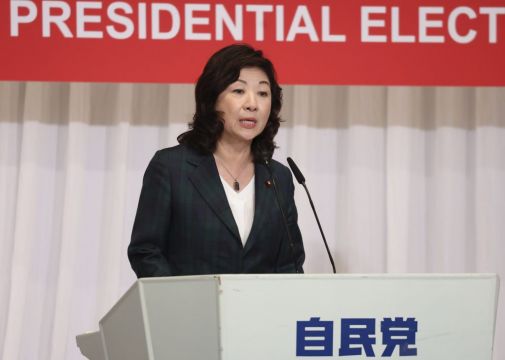The race is on to see who will be the next Japanese prime minister.
Official election campaigning kicked off on Friday to find the new head of Japan’s governing Liberal Democratic Party, a role that typically signals the next national leader.
Four candidates are competing in the September 29 vote to replace outgoing prime minister Yoshihide Suga, who will quit when his term ends at the end of this month after serving only one year. He took over from predecessor Shinzo Abe.

Unusually for Japan, two women are competing in the race. The only other female challenger was in 2008 – Yuriko Koike, who is currently serving as Tokyo governor.
The four candidates each submitted their official candidacy at party headquarters ahead of a series of joint public debate sessions and other campaigning planned over the next 12 days.
Their policies focus on the pandemic and its economic fallout, and the increasingly aggressive role China has played in regional affairs.
Support ratings for Mr Suga and his government nosedived because of his handling of the virus and insistence on hosting the Olympics despite the pandemic, and the party is hoping that a new face can bring them victory in general elections that must be held by late November.

Mr Abe’s long reign saw unusual political stability, but also what critics characterised as an autocratic and ultra-nationalistic approach.
Taro Kono, currently the minister in charge of vaccinations and considered a front-runner in the election, said as he launched his campaigning that he wants a society that people will see as compassionate.
Considered a maverick in Japan’s conservative political culture, Mr Kono says he also seeks to reform his own party.
Former foreign minister Fumio Kishida, considered a close contender with Mr Kono, said he will listen to the voice of the people and “restore a sense of unity to this country divided by the coronavirus pandemic”.

Once seen as an indecisive moderate, he has shifted to a security and diplomatic hawk as he seeks support from influential conservatives like Mr Abe.
Sanae Takaichi, who shares Mr Abe’s right-wing and revisionist political views, is seeking to be the nation’s first female prime minister.
Calling for a stronger military, the former internal affairs minister said she wanted ample government spending to create a “beautiful and strong Japan that grows”.
“It’s not just strength we need,” said Seiko Noda, a former postal and gender equality minister and the other candidate hoping to become Japan’s first female leader.
A late entrant, Ms Noda vows to achieve a diverse and inclusive society that she said is lacking in Japan.







